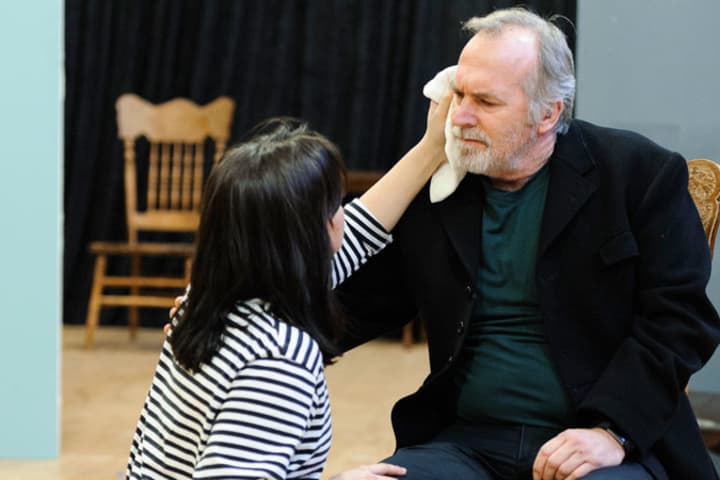Deidre Rubenstein discusses how her character Anne Marie is a voice of truth in Lucas Hnath’s script.
Note: the following interview contains spoilers.
What do you think the driving force behind your character is?
Anne Marie has been a faithful servant, she’s given up her own life completely to be a dutiful and loving servant. She’s been like a mother to Nora, she’s brought her up, and she’s kept everything going while she’s been away. Anne Marie has looked after Torvald and raised the children, and now that Nora has come back, she would like to have some kind of reconciliation.
How do you inhabit your character? Do they have specific gestures, movements, facial expressions?
Hnath says that Anne Marie has a limp, so she has a small hobble because of arthritic knees. I went to a physio and they suggested she walk on the sides of her feet, and they gave me an exercise to counteract any negative effect that might have.
Anne Marie is not young, she’s tired, but she also has a great spirit and sense of humour. She’s also a different class from the Helmers, so she doesn’t speak as well as they do. For me as an actor, the voice is always my way in. I’ve arrived at the way my Anne Marie speaks through an internal and intuitive process. We’re not doing British accents – Sarah Goodes (Director) wanted us to speak in our own voice – which I think adds to the immediacy of the work.
We’re also in period clothes. There’s a fascinating juxtaposition between the strictures of the clothes we’re wearing, and the contemporary nature of the language, and that dissonance – what that sets up – is fascinating. It will be great for the audience to come from those two perspectives simultaneously, to be reminded of how it was, and to think about how it is now. Everything is in the light of everything else.
How does your character grow during the course of the play?
Anne Marie is able to speak her own truth, and be a voice of truth. She names things very clearly. Anne Marie really thinks she’s screwed things up, though she had the best of intentions. She blames herself for allowing Nora to come, but in fact I think she achieves what she had most wanted, albeit with pain along the way. Emmy does meet her mother. Nora has to come to terms with the fallout from her leaving, and she and Torvald do arrive at an honest, and almost affectionate, resolution.
What is A Doll’s House, Part 2 about in your own words?
What I think is fascinating is how the play presents arguments from every angle. I read an interview with Hnath about a book he has on his bookshelf that says, ‘What do we owe each other?’ Apparently he bought the book at a sale, and hasn’t read it, but that phrase informed a lot of his writing. I think that’s a lot of what this play is about: how true are you to your own calling, as opposed to what you owe another person? I think this play is about Nora following her own development as a person, and finding out who she is. Hnath asks in the play, ‘What is a true marriage?’ How do we not become subsumed by it in a way that we cannot express our true nature? The play explores marriage, freedom, independence, fidelity, feminism, but all from the point of view of those times and how it applies to us now.
How would you describe the actor-audience relationship in this production?
I’m fascinated to see how this will be received, because my sense is that every single audience member will be identifying with each character at various points in the play. Every character’s point is valid, and you see how fallible we all are, and how noble we all are. I think the audience will be examining their own lives in relation to the ideas that are brought up in the play, to the most inordinate degree. There’s no real narrative, it totally is a play of ideas, but it has great humanity. I suspect it will be quite visceral for an audience.
Do you have a favourite line from Hnath’s script? It mightn’t be your own.
NORA: ‘It’s really hard to hear your own voice,
and every lie you tell
makes your voice harder to hear,
and a lot of what we do is lying.
Especially when what we want so badly
from other people
is for them to love us.’
That seems really profound to me. It’s very interesting how Hnath writes, the layout of the text is an indication of how to deliver it. You have to honour the punctuation.
Is there anything else you’d like to share with students about A Doll’s House, Part 2?
It’s unusual in that it’s a series of argument points, like a debate, but infused with such humanity. It’s brilliantly constructed and the stakes are very high. The juxtaposition of period and contemporary seems unique to me. I also love the daring nature of the fact that it’s ‘Part 2’, it’s so audacious.
A Dolls House, Part 2 plays at Southbank Theatre from 11 August 2018.
Published on 2 August 2018





